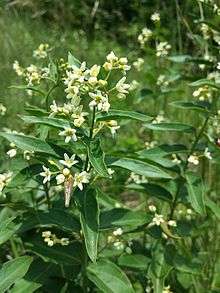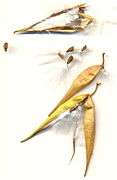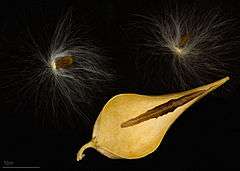Vincetoxicum hirundinaria
| Vincetoxicum hirundinaria | |
|---|---|
 | |
| Scientific classification | |
| Kingdom: | Plantae |
| (unranked): | Angiosperms |
| (unranked): | Eudicots |
| (unranked): | Asterids |
| Order: | Gentianales |
| Family: | Apocynaceae |
| Genus: | Vincetoxicum |
| Species: | V. hirundinaria Medik. |
| Binomial name | |
| Vincetoxicum hirundinaria | |
| Synonyms | |
|
Asclepias vincetoxicum L. | |
Vincetoxicum hirundinaria, commonly named white swallow-wort, is a long-lived herbaceous perennial of the genus Vincetoxicum in the family Apocynaceae.
Etymology
The generic name Vincetoxicum, in Latin meaning ‘conqueror of poison’, derives from the traditional use of this plant has as an antidote to poisons. [2] The Latin species name hirundinaria (from hirundo, meaning swallow) and the common name white swallow-wort refer to its seedpods, that are reminiscent of a swallow's wing, or tail.
Description
Vincetoxicum hirundinaria can reach a height of 30–70 centimetres (12–28 in). Stem is erect, stout and glabrous. Flowers in whorls form a raceme. They have a diamenter of about 1 centimetre (0.39 in). Corolla has five white petals. Calyx is composed by five fused, sharp-pointed sepals. Leaves are opposite, ovate to lanceolate and short-stalked. Fruits reach a length of about 5 cm and contain many seeds showing a tuft of white hairs. Flowering time lasts from June to the end of July. [2]
Distribution and habitat
This species is native to cliffs and slopes, especially in calcareous soils, of continental Eurasia (including some Baltic islands).[3] There are introduced populations in North America (Ontario, Michigan, and New York).[1] It is not present in Great Britain and Ireland.
Human culture
Vincetoxicum hirundinaria is a venomous plant traditionally used in treating diseases and in magic. The plant was mentioned by Pedanius Dioscorides as a traditional plant used by Dacians and known as "ZOO-USTE", the "herb of animals", believed to open any locked door.[4]
Gallery
- Close-up on flowers
 Seeds and hairy wool
Seeds and hairy wool Fruit and seeds
Fruit and seeds Illustration
Illustration
References
- 1 2 "Cynanchum vincetoxicum (L.) Pers.".
- 1 2 Nature Gate
- ↑ Leimu, R (Jan 2004). "Variation in the mating system of Vincetoxicum hirundinaria (Asclepiadaceae) in peripherial island populations" (Free full text). Annals of Botany. 93 (1): 107–13. ISSN 0305-7364. PMID 14678943. doi:10.1093/aob/mch012.
- ↑ Bucurescu, Adrian (22 August 2012). "Iarba fiarelor". The Epoch Times, Romania. Retrieved 24 March 2013.
External links
 Media related to Vincetoxicum hirundinaria at Wikimedia Commons
Media related to Vincetoxicum hirundinaria at Wikimedia Commons Data related to Vincetoxicum hirundinaria at Wikispecies
Data related to Vincetoxicum hirundinaria at Wikispecies